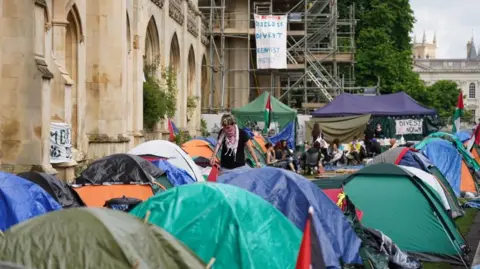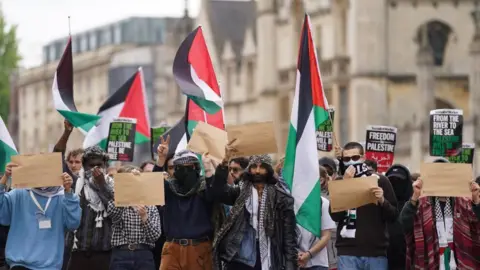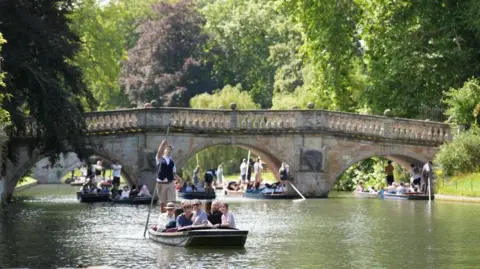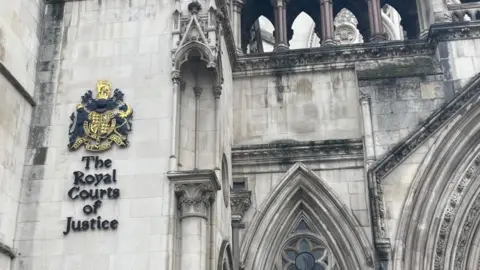Protesters barred from disrupting degree ceremony
 PA Media
PA MediaA High Court judge has barred pro-Palestinian campaigners from disrupting a Cambridge University graduation ceremony.
Mr Justice Fordham imposed an injunction covering a ceremony due to take place on Saturday, following an application by lawyers representing the university.
They had raised longer-term concerns about ceremonies being disrupted, but failed to persuaded the judge to impose a wider injunction.
A union had condemned the university legal action as a "shameful" attack on democratic rights.
Protest camps were set up in Cambridge following the outbreak of conflict in Gaza, between Israel and Hamas, in late 2023.
Pro-Palestinian campaigners had alleged that Cambridge University had not acted on previous agreements to review investments in relation to the arms industry.
Lawyers told Mr Justice Fordham how protests had disrupted a number of degree ceremonies.
They asked him to make an order covering four university premises in Cambridge, which would last until 2030.
 PA Media
PA MediaBarrister Yasser Vanderman, who led the university's legal team, said some "defendants" formed part of a "well organised" group with "strong and committed" views on the conflict.
The university wanted "injunctive relief" to "restrain threatened acts of trespass and nuisance", he said.
Mr Vanderman asked for an injunction to last five years - with annual reviews - arguing that given the "long-standing nature" of the Gaza conflict, such a time-frame was reasonable.
But the judge said he was not prepared to make any "final" order - or any order lasting five years.
He granted an injunction focused on a ceremony due to take place at Senate House, on Trinity Street, on Saturday.
The judge said only a limited order, which would last until 23:00 GMT on Saturday, was justified. He said he aimed to reconsider the case in the near future.
No protesters were at Thursday's hearing in London and none were represented by lawyers. The university took the legal action against "persons unknown".
A lawyer said, after the hearing, that the injunction would run through Friday and Saturday and, in essence, bar anyone from entering Senate House, or nearby Senate House Yard, without university permission.
Lawyers said anyone thought to have breached the order could face legal action and be found in contempt of court.
 PA Media
PA MediaA number of organisations had condemned the university's injunction application.
The University and College Union (UCU), campaign group Liberty and the Palestine Solidarity Campaign raised concerns.
Jo Grady, UCU general secretary, said it was a "shameful attack on basic democratic rights".
However, Cambridge University had said any claim that it was trying "restrict protest" was "ridiculous", adding it was trying to protect students and staff.
 Brian Farmer/BBC
Brian Farmer/BBCFollow Cambridgeshire news on BBC Sounds, Facebook, Instagram and X.
